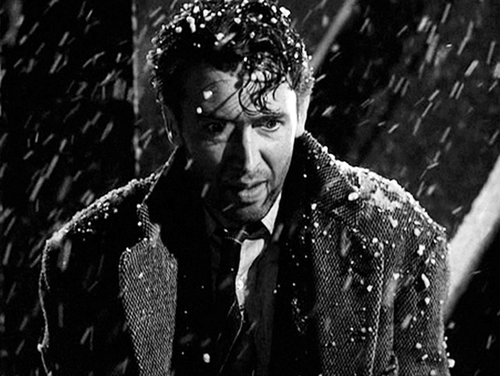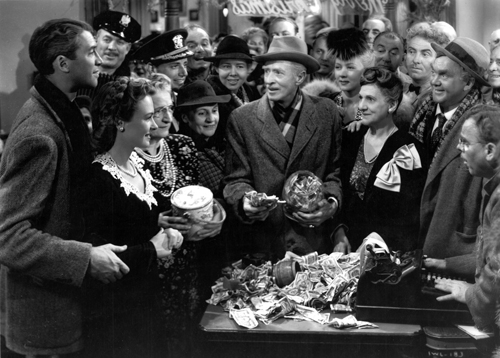
Your complimentary articles
You’ve read one of your four complimentary articles for this month.
You can read four articles free per month. To have complete access to the thousands of philosophy articles on this site, please
Films
It’s A Wonderful Life
Becky Lee Meadows considers questions of guilt, innocence, and despair in this classic Christmas movie.
Frank Capra’s 1946 masterpiece It’s A Wonderful Life is regularly included in lists of the best-ever Christmas films. Though its ending is heart-warming and life-affirming, it nonetheless deals with weighty issues of injustice, dishonesty and self-sacrifice.
Viewers of the film often regard Old Man Potter (played by Lionel Barrymore) with disgust as he listens to George Bailey (James Stewart) falsely confess to mishandling funds. After all, George is a good man who has spent his life aiding others, often to the detriment of his own dreams. And yet, even as we watch George’s friends line up at the end of the movie to help him out, we see the quintessentially evil Potter get away with the same $8,000, which had actually been mishandled by George’s Uncle Billy (Thomas Mitchell). We’re left unsettled even though we realize George will not go to jail and that Billy is safe: why was justice not complete? Surely a God of justice (who is referenced in the film) would see George rewarded appropriately for his actions, as well as punishing Potter? The works of French philosopher Paul Ricoeur (1913-2005) will help us understand that George’s false confession and Uncle Billy’s lack of confession create a barrier to the achievement of complete justice.
It is important to first note that even though George confesses on at least two occasions to something he didn’t do, he obviously has superior moral values, and that the false confessions are the result of those values. Throughout the film, George pushes his own dreams into passivity as he helps fulfill the dreams of others. He gives his college money to his brother Harry instead because the board of directors for Bailey Building & Loan insists that George run the business after his father’s death. He purchases the dilapidated home that his wife Mary wants though he is not particularly fond of it, and invests in it to renovate it as their home. He also invests in a housing project, Bailey Falls, where those whom Potter calls ‘rabble’ have the opportunity to purchase a home. And he fights throughout his life to maintain justice in the town that Potter endeavors to control. Even as a child, George is a saintly character who jumps into an ice-covered pond to rescue his brother from drowning. As his father says, “You were born older, George.” As George continues his fight against evil, however, we see him fall into Kierkegaardian despair in light of a seemingly impossible situation regarding the missing money, which leads to his psychological journey to an alternate reality where his guardian angel thrusts God into George’s awareness.

Not wonderful yet
Film images © RKO Radio Pictures 1946
The Power of Confession
Let’s begin our discussion of George’s journey with the idea of confession in Ricoeur’s The Symbolism of Evil (1967). For Ricoeur, the confession of a religious consciousness is the key to understanding what humanity has come to call evil. ‘Evil’, which Ricoeur defines as defilement or sin, occurs when the bond is broken between humanity and what it considers sacred. However, only in the progress of conscience, as it advances beyond the defilement, is the meaning of defilement recognized. This leads to Ricoeur’s philosophy of sin. ‘Sin’ is perceived when conscience recognizes that the bond between man and God (the concept behind the Hebrew covenant with God in the law of Moses) has been broken. In the Jewish Bible (the Old Testament), the Hebrew prophets point to different types of evil that are sin: iniquity, which comes from a wicked heart; pride; arrogance or false greatness; and adultery, which is unfaithfulness. Such sins are acknowledged at times by the absence of God, which, according to Ricoeur, is an “insecurity and an anguish worse than suffering” (p.57).
After the initial defilement and recognition of sin, Ricoeur turns to the ensuing guilt people may feel. He writes, “Guiltiness is never anything else than the anticipated chastisement itself, internalized and already weighing upon consciousness; and as dread is from the beginning the way of internalization of defilement itself, in spite of the radical externality of the evil, guilt is a moment contemporaneous with defilement itself” (p.101). So defilement is not a physical stain, but a symbolic stain, and sin is the recognition of the breaking of the covenant between humanity and what it considers sacred – which in Ricoeur’s terms is often God or his laws. But a consciousness of the fault is not fully experienced until it is expressed through the language of confession – which is where the movie comes in.
As Ricoeur writes (p.7),
“It is this emotional note that gives rise to objectification in discourse; the confession expresses, pushes to the outside, the emotion which without it would be shut up in itself, as an impression in the soul. Language is the light of the emotions. Through confession the consciousness of fault is brought into the light of speech; through confession man remains speech, even in the experience of his own absurdity, suffering, and anguish.”
For Ricoeur, the problem comes through the relationship between a person’s life ‘as the bearer of meaning’ and the mind ‘as capable of linking meanings into a coherent series’. The bridge between the meaning in life and meaning being understood in the mind of the individual, are the symbols and metaphors used in language, both of which bear the meaning of lived experiences and point to something other than themselves. Confession manifests itself in language, too; and for Ricoeur, that language of fault is essentially symbolic: “for the most primitive and least mythical language is already a symbolic language: defilement is spoken of under the symbol of stain or blemish, sin under the symbol of missing the mark, of a tortuous road, of trespass, etc. In short, the preferred language of fault appears to be indirect and based on imagery” (p.9). In It’s A Wonderful Life, however, the symbolism of what is not confessed is integral to understanding the perceived lack of complete justice at the end of the film.
We begin to see the language not present in George’s lack of confession, or false confession, when we first see George as a youth, working for Mr Gower at the local drug store. Gower, obviously upset and inebriated, barks orders to George to deliver some medicine to a family. George then turns from the counter and picks up a telegram laying on the cash register, telling us that his son has died unexpectedly. George asks Gower if he can help, and Gower orders George to make the delivery. However, George sees that Gower has accidentally put poison powder in the pills; but Gower simply hushes him when George tries to explain what he has seen. Instead of insisting on explaining the situation, however, George simply does not deliver the medicine – in effect omitting to tell the truth. After the family calls to report the missing medicine, Gower slaps George several times, and as George cries, he blurts out the mistake that Gower made. Gower sees the error of his ways and apologizes, but the damage is done: George has established a pattern of taking the blame for the actions of others. In essence, George’s lack of confession is, as Jean-Paul Sartre might put it, an act of ‘bad faith’, because it leads to lies and false perceptions, while George does nothing to ensure that the truth becomes known. In fact, the benevolent force telling the story of George’s life is quick to point out that George never tells anyone else about the incident. As per Ricoeur’s ideas, George’s dishonesty defiles him, and there is no confession to cleanse his defilement. In fact, until we see George in despair at the climax of the movie, God and the idea of the sacred is absent from his active awareness.
Indeed, George’s quintessential lack of confession is best evidenced at the climax of the film as he sits across a desk from Potter. Uncle Billy thinks he himself has misplaced the $8,000 of the Bailey Building & Loan’s money, although in fact he mistakenly gave the money to Potter in a folded newspaper. The bank examiner then visits Bailey Building & Loan, and is analyzing the business accounts. Billy silently confesses to George that he lost the money. We see George go into Billy’s office and close the door, and we know something is wrong when George emerges. He and Billy retrace Billy’s route to the bank that morning, but do not find the money. As they search, Potter watches through his own partially open office door, but makes no attempt to reveal that he has the missing money. The idea that the bank examiner will discover that the money is missing spirals George into despair.

The Depths of Despair
The Latin word for despair, desperare, translates as ‘to be hopeless’. The Catholic Encyclopedia says this about despair:
“Despair, ethically regarded, is the voluntary and complete abandonment of all hope of saving one's soul and of having the means required for that end. It is not a passive state of mind: on the contrary it involves a positive act of the will… There is presupposed an intervention of the intellect in virtue of which one comes to decide definitely that salvation is impossible. This last is motivated by the persuasion either that the individual's sins are too great to be forgiven… or that Almighty God is unwilling to aid the weakness or pardon the offenses of his creatures, etc.” (Joseph Delaney)
The sin of despair is not to be confused with the idea that some people worry about their place in the afterlife. Rather, according to Catholic doctrine, despair is a mortal sin because it thrusts aside the attributes of God that allow for salvation. This effectively bars the way to escape from sin, and those who suffer from despair often indulge freely in other sins as a result.
This idea of despair is akin to the thought of Søren Kierkegaard (1813-55). For the Danish proto-existentialist philosopher, despair is born from the endless choices individuals face alone: as Brooke Moore and Kenneth Bruder write, “It is the result of the individual’s having to make, for himself and alone, choices of lasting significance” (Philosophy: The Power of Ideas, 2005, p.167). To put it succinctly, for Kierkegaard, despair is the ‘sickness-unto-death’. He pretentiously elaborates on what this means in the following passage:
“To me an even more horrible expression of this most terrible sickness and misery is that it is hidden – not only that the person suffering from it may wish to hide it and may succeed, not only that it can so live in a man that no one, no one detects it, no, but also that it can be so hidden in a man that he himself is not aware of it! And when the hourglass has run out… eternity asks you… whether you have despaired in such a way that you did not realize you were in despair, or in such a way that you covertly carried this sickness inside of you as your gnawing secret… or in such a way that you, a terror to others, raged in despair. And if so, if you have lived in despair, then, regardless of whatever else you won or lost, everything is lost for you, eternity does not acknowledge you, it never knew you – or, still more terrible, it knows you as you are known and it binds you to yourself in despair.”
(The Sickness Unto Death, 1849, trans. Howard V. Hong and Edna H. Hong.)
This is akin to Aquinas’s idea that despair effectively bars one from salvation.
In It’s A Wonderful Life, we see George on a path to the damnation of suicide when he’s faced with the seemingly impossible task of finding the missing $8,000. He screams at Billy, to whom he had always been patient and kind, “Where’s the money, you silly, stupid old fool? Where’s that money? Do you realize what this means? It means bankruptcy and scandal and prison, that’s what it means. One of us is going to jail. Well, it’s not going to be me!” It’s as if George anticipates his taking the blame for Billy’s action – a pattern he first established with the incident in Gower’s drug store. He performs as expected. Then, after going home to berate his wife and children to the point where he asks his wife, Mary, “Why do we have to have all of these kids?” – clutching at the children and crying as he moves in an emotional frenzy from kindness to rage. We then see God in Mary’s active awareness after George’s daughter, Janie, asks if she should pray for her father: “Yes, pray very hard,” Mary replies.
In despair, instead of turning to God George chooses to seek Potter’s aid. Potter, of course, is less than effectual in helping George; and yet he is the driving force that presents the opportunity for God to help George through Clarence, George’s guardian angel. George begs for Potter’s assistance with this false confession: “I’ve just misplaced eight thousand dollars. I can’t find it anywhere,” to which Potter replies, “You’ve misplaced eight thousand?” George replies, “Yes, sir” – engaging in yet another false confession. Potter, not impressed with George’s self-sacrificial intent, seizes the opportunity to crush him at last: “Look at you. You used to be so cocky. You were going to conquer the world. You once called me a warped, frustrated old man. What are you but a warped, frustrated young man, a miserable little clerk crawling in here… You’re worth more dead than alive.” It’s after this that George contemplates suicide, and Clarence the angel intervenes to show George what peoples’ lives would have been like without him.
First, however, George seeks solace in alcohol (something to which he never previously turned in the film), and here we see the depths of his despair: “God, oh God, dear Father in heaven, I’m not a praying man, but if you’re up there and can hear me, show me the way. I’m at the end of my rope. Show me the way, God.” Note however that this is not a confession of his false confession, nor an acknowledgment of Billy’s guilt. Then, when the husband of his daughter’s teacher hits him in the mouth for berating his wife over the telephone, George replies, “That’s what I get for praying.” It is apparent at this point that George’s despair is governing his thoughts and actions – an idea displayed even more fully when George is about to throw himself off the bridge into the river below. Suicide is the deepest depth of despair.

“We love you George!”
De Profundis
George most fully descends into symbolic hell when Clarence leads him to see the world as it would have been without him – arguably the film’s most important point, as well as its most famous one. Here, among other significant differences, the main street, formerly lined with family-owned businesses funded by Bailey Building & Loan, is transformed into a Vegas-like showcase of bars, strip joints, and other lewd establishments. George has obviously been an instrument of good in Bailey Falls without even knowing it. As Clarence explains, “Each man’s life touches so many other lives, and when he isn’t around, he leaves an awful hole, doesn’t he?”
Clarence’s revelation helps George crawl out of the hell he enters when he despairs and wishes he had never been born, and George transforms into a grateful man, happy just to be alive. The end of the movie illustrates the value of friends and the idea that God did not forsake George, even though George never confessed that he didn’t lose the money. Rather, George’s friends gather around him and donate money to him in a Christmas moment reminiscent of Scrooge’s exuberance at the end of Dickens’ A Christmas Carol. And yet, something is still amiss – Potter has made off with $8,000 of the Bailey Building and Loan’s money, and we see no justice for him in sight. In fact, though, he completely disappears from our awareness as we embrace the loving moment of friendship that highlights the end of George’s journey to the depths of despair and back into the light.
© Becky Lee Meadows PhD 2024
Becky Lee Meadows is an Associate Professor of Philosophy at Galen College of Nursing.









